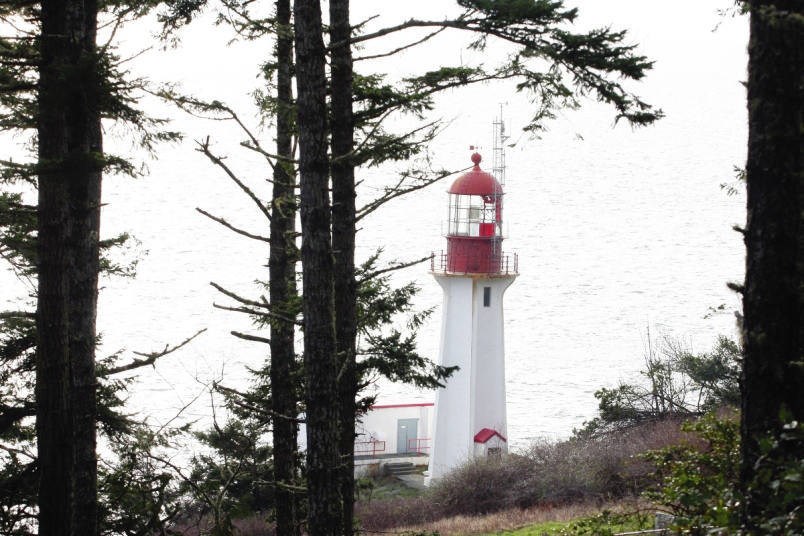I often go into passionate raptures over architecture, such as the Sagrada Familia, the Hagia Sophia, the Guggenheim(s) or, here at home, the Art Gallery of Ontario. I marvel at their truly innovative and remarkable design and structure, lines and light, colour or lack thereof, deconstruction-isms, and slabs or beams of imaginative and pioneering materials. (Remember when the CBC building appeared in Vancouver? It was inside out with all the piping on the exterior.)
I seldom, however, feel deeply moved or touched by architecture.
Have you ever been moved by architecture? Not so much in awe, but truly, emotionally stirred?
One piece of construction that does that for me is the lighthouse. It may not have towering spires and copulas, silver cobalt enamelled onion domes, great gleaming titanium walls that reflect in moonlight on the black river, massive arcs and buttresses, amber walls, mile-long mirrored corridors lined with 100 amethyst chandeliers, or gardens with a thousand golden fountains.
But more than any of this, the little lighthouse of modest construction, white and sea-spray whipped, with its little red top, is a symbol of caring, of help and of guidance. It’s our guardian at sea, always there, dependably warning of danger, casting and penetrating its great illuminated beam through the thick veil of pea-soup fog in the most violent and turbulent green-grey ocean gales, in what we call the Graveyard of the Pacific, from its cold and lonely barren rock, where only a few lichens and gnarled, hardy windswept shrubs might reside, there to guide us through the storms, as if saying: “I am here … I am here … I am here” with its powerful rhythmic glow.
To fully appreciate these little saviours, and to perhaps pay tribute to them by visiting one (within your community during COVID-19, of course), I recommend the lovely little book To The Lighthouse, An Explorers Guide to the Island Lighthouses of Southwestern B.C. by Peter Johnson and John Walls, with photography by Richard Paddle (2015, Heritage House).
Yes, it actually begins with a beautiful quote from Virginia Woolf, author of the novel To the Lighthouse, followed by a heartwarming forward by author Gary Geddes, in which he compares the artist with a lighthouse keeper.
The book is a compilation of 25 detailed and fascinating descriptions of lighthouses, each rated in difficulty in terms of reaching their location – “Really Really Hard” indicates you must be “experienced hikers, campers and/or kayakers” and “plan to be out for several days,” but the “Dead Easy” and “Still Easy” options are do-able for most of us – there’s usually a parking lot and the tri makes for a lovely afternoon excursion (take a picnic on the next balmy day).
There are historical descriptions of how the great light developed, beginning with the (impractical) flaming wicks that were not only filthy, but simply did not produce enough light to reach through a wild tempest. “Even 10 wicked lamps stacked together still didn’t produce a flame big enough to be seen 30 kilometres out to sea.”
Lebanese alchemists experimented with hot mercury, but ultimately mirrors and prisms developed into powerful reflective lamps, first by accident (as most inventions happen) when a wine decanter was dropped in 1789 in a “dimly lit Parisian restaurant.”
The lighthouse keeper’s arduous, backbreaking, never-ending, round-the-clock tasks make an impressive list — I will never complain again about washing the kitchen floor on my hands and knees.
Here is a condensed sample of the keeper of the light’s duties: “Twice weekly, dismantle the heavy reflectors and carry them down the tower and polish them … pick off the fish, dead birds and droppings from the glass … fill the whale oil, coal oil, or paraffin (kerosene) reservoirs and clear the feed lines of debris …”
Lighthouse keepers had to be skilled in mechanics, flag semaphore, business and gardening — supply ships often could not deliver food due to storms.
The first lighthouse mentioned in the Victoria area is a description of the Sheringham Point Lighthouse near Shirley. The authors have donated 25 per cent of their royalties from this little book to the Sherington Point Lighthouse Preservation Society.
There are maps and photographs (some historic, such as of the hand cranked fog horn) throughout this charming book.
You can learn more by going to the Parks Canada website of National Historic Sites. In 2008-2010, Canada adopted a new law to protect these beautiful, dignified guardians, although community efforts have taken on the responsibility for their loving care and maintenance.
The National Trust for Canada is also an informative site.



